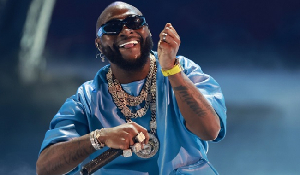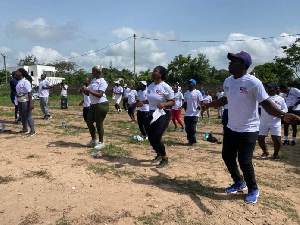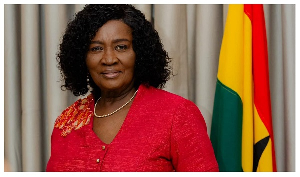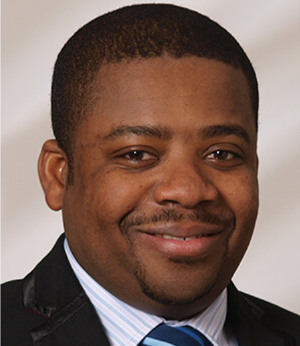We shall begin the second installment with a quote from Ahmed S. Bangura’s essay “African and Black Orientalism: Orientalism, African Literature, and Criticism.” This essay says in part:
“The thought was impressed upon him by an address given in 1978 by Wole Soyinka in which Soyinka praises Sembene Ousmane, a Senegalese writer, for being critical of Islam in his work while denying Cheikh Hamidou Kane, another Senegalese writer, the merit of authenticity for depicting Islam as part of Senegal’s heritage rather than as an alien religion that was imposed through violence and other coercive means.” It continues: “Similarly, in the early 1990s Ali Mazrui and Wole Soyinka were locked in a debate pertaining to the question of African authenticity and the Islamic factor. Ali Mazrui wrote the article ‘Wole Soyinka as a Television Critic: A Parable of Deception’ in response to Soyinka’s negative critique in ‘Index to Censorship’ of Ali Mazrui’s television series, ‘The Africans: A Triple Heritage.’ In his article, Soyinka accuses Mazrui of denigrating indigenous African culture in the series. Perhaps more significantly, he alludes to the fact that Mazrui is not only culturally Arabized, he is also both blood and vocal identification part Arab.”
We shall end the quote with the following critical observations:
“In both the address alluded to by Edris Makward and the debate between Soyinka and Mazrui, Soyinka repeats some of the negative opinions about Islam that one finds in colonial writings: Islam is a seductive superstition that was imposed on the Africans through the sword. Perhaps more significantly, Soyinka is ready to discredit an African scholar’s interpretation of African history on the basis that the scholar is a Muslim and has allegedly Arab-Islamic sympathies. Wole Soyinka’s critique of Islam is part of an intellectual current that some commentators would consider to be Orientalist. It is related to the issue of Islam and African or black identity. Some African and black scholars assert that black Americans and black Africans who profess or advocate Islam are committing a form of cultural apostasy. They are critical of alien ideologies such as Islam, which have allegedly brought havoc to Africa and the Black Diaspora.”
This lengthy quotation accomplishes three essential facts: (1) It gives a general description of what “Black Orientalism” is, (2) It provides Wole Soyinka’s philosophical take on Islam and its excesses (See also Soyinka’s essay “And Now, The Ecumenical City of Jos”), (3) It provides a backdrop to the fierce debate that raged on between Soyinka and Mazrui in the late 1990s, and (4) How these two great scholars made Africa the heart of their intellectual inquiries and how both worked tirelessly to see Africa and the world become a better place for the habitation of mankind. However, the divisive tendencies between Soyinka and Mazrui aside, the relationship that tenuously held the three, Gates, Mazrui, and Soyinka, together had some interesting features worth pointing out, as they were not “enemies” in the strictest or technical sense of the word.
One could, however, make the argument that the conflict between the two, particularly between Soyinka and Mazrui, may have arisen from their different backgrounds, of which religious and cultural bias, academic specialty, drive for academic prominence, differences in worldviews and political philosophies, ideological sympathies, personal ambitions, mutual jealousies, and rivalry between the two as to who eventually became the celebrated spokesperson for Africa, informed their intellectual antagonism in the 1990s. This phenomenon happens all the time in intellectual circles regardless of geography. It is human nature. Asante, for instance, has taken note of Mazrui’s jealousy of Cheikh Anta Diop’s intellectual prowess and analytic gifts as grounds for his opposition to Diopian scholarship. Back to the interesting features binding the three, Gates extended Mazrui formal permission to publish in the prestigious Transition Magazine (Harvard University) without reservations. Mazrui himself later profusely expressed his gratitude to Gates for the opportunity to publish in the magazine despite Gates’ close association with Soyinka.
Also, both Mazrui and Soyinka were honored with formal invitations to give the prestigious and highly competitive BBC Reith Lectures. Accordingly, Mazrui gave his presentation in the late 1970s, titled “The African Condition: A Political Diagnosis.” In 2004 Soyinka’s time came and he gave his lecture titled “Climate of Fear: The Quest for Dignity in a Dehumanized World” (Royal Institution, London). As expected, both presentations dealt with several important and critical aspects of the human condition. Aside that, both Mazrui and Soyinka demonstrated a enviable heights of writing sophistication throughout their academic lives. Mazrui’s book “The Political Sociology of the English Language: An African Perspective” and Soyinka’s “Myth, Literature and the African World” speak to Africa’s remarkable contributions to the sociology of language, the English language specifically, among others. Henry Louis Gates, Jr., an intellectual sandwich between Mazrui and Soyinka, is a sophisticated and complex writer himself. The book “The Signifying Monkey: A Theory of African-American Literary Criticism,” a masterpiece on literary criticism that won the 1989 American Book Award, testifies to Gates as a formidable, sophisticated writer in his own right.
Let us make it clear here that we are not implying the three despise their “native” tongues, quite the opposite. Mazrui wrote about his fascination with Swahili, its textural richness and rich cultural history behind the civilizations of the eastern coast of Africa. Soyinka’s cultural allegiance to Yoruba in particular and African languages in general is proverbial. Nevertheless, he has leveled constructive plaints against the labyrinthine sophistication of Yoruba as a language whose internal rhythmicity, call it syntactic complexity, forced him to abandon a project he had been working on, that is translating works from other languages into Yoruba.
Soyinka has finally succeeded in translating two major works in Yoruba, one from English and the other from Igbo. Gates has also made an interesting observation in which he alluded to Soyinka’s unconscious appropriation of and inclusion of Shakespearean literary elements in his creative work. What about Soyinka’s contributions to the English language and English literature? In contrast, Gates has offered a theoretical background to how the West should interpretively read the “black” text by grasping its contextual symbolism in their diverse cultural manifestations, particularly Africa’s (See his work “Figures in Black: Words, Signs, and the ‘Racial’ Self”).
Gates has also made a very powerful case in support of the canonization of the “black” text with the Western corpus. Cornell West has advanced similar arguments. Ngugi wa Thiong’o and Molefi Kete Asante have weighed in on the canonization question, building upon the idea that Africa’s cultural and intellectual investment in foreign languages, especially Western, come with a heavy price, cultural suicide and linguistic assassination. Yet Gates goes on, together with the late Nellie Y. McKay, a well-known former professor of English and literature, to compile a compendium of African-American literature outside the gated community of the Western canon.
Gates and McKay exclude African literature and literature of the African Diaspora from the immediate context of the African-American experience. Mazrui, who successfully galvanized the African intellectual community to respond to Martin Seymour-Smith’s racist compilation “The 100 Most Influential Books Ever Written: The History of Thought from Ancient Times to Today” that excluded continental African writers and writers from the African Diaspora, and others came up with “Africa’s 100 Best Books of the 20th Century” devoid of bibliographic entries for the African Diaspora and others outside the racial geography of the African world.
Significantly, Asante has never ceased to laud Mazrui for his sophisticated writing formula, while still taking issue with some of the content of his large corpus of writings as they relate specifically to cultural theory, Eurocentrism, comparative political theory, and North-South historiography. In fact, Mazrui wrote profusely covering a large swath of topics of enormous interest to the reading public, universities, nations, etc. Mazrui’s essay “Positive Side of Idi Amin,” a controversial piece that points out some of Amin’s major positive contributions to the de-colonization process and African politics against a backdrop of Mazrui’s intermittent comparison of Amin’s presidency with Jimmy Carter’s, is an insightfully interesting if provocative read, recalling that Mazrui used to be one of Amin’s informal advisors before the latter began clamping down on intellectuals and others highly critical of him and his government.
However, in another interesting essay “Appreciating Ali Mazrui,” Prof. P. Anyang Nyong’o, author of the just-mentioned essay, notes:
“Mazrui began the debate by tracing the colonial origins of the written word in Africa, pointing out that although colonialism exploited Africans, on the other hand it brought such good things as education and the written word which were used positively for national liberation.”
The debate in question included Walter Rodney and others. And it took place in the Main Hall of Makerere University, 1970. Still, according to Prof. Nyong’o, Rodney’s response to Mazrui assumed the following sarcastic cast: “Professor Mazrui has argued that colonialism was good; that on the one hand this and on the one hand that. Colonialism had only one hand: The hand of oppression, the hand of exploitation. Education was mainly a means to oppress and exploit African brothers and sisters.” Mazrui would later come back to defend his remarks, pointing out to the audience a lack of animosity between them just because he and Rodney had shared different perspectives on the role of colonialism in Africa’s modernization.
Yet Rodney’s grasp of Mazrui’s liberal approach to colonial history may possibly explain why other critics have characterized Mazrui as a proponent of Africa’s recolonization. It is interesting to note, however, that Mazrui could not successfully shake off the yoke of colonialism, Eurocentrism, and neocolonialism in his thinking even though he virtually spent a considerable portion of his entire academic existence fighting them.
It may also be recalled how Mazrui vigorously opposed Cheikh Anta Diop on the historiography of Ancient Egypt, an attribution linked to Asante, though he had failed to match Diop’s multidisciplinary expertise and wide repertoire of knowledge. Science has since exonerated Diop. Yet in another provocative essay “Nkrumah: The Leninist Csar,” Mazrui engaged the legacy of Kwame Nkrumah, one of his greatest intellectual influences, through selective critique of Nkrumah’s political personality, much in the vein of Kwame Anthony Appiah’s scathing critique of W.E.B. Du bois in his controversial work “In my Father’s House: Africa in the Philosophy of Culture.”
However, the point is not to discredit the instrumentalist gains that potentially accrue from the culture of criticism, far from it, but rather to make the case that constructive criticism is a normal component of human existence and that the exercise of critique itself enriches human experience, if only it is executed without biases of any kind or form. Unfortunately biases are inseparable from the social or cultural genomics of intellection. W.E.B. Du Bois’ tireless contributions to de-colonizing America made formation of Harvard University’s W.E.B. Du Bois Research Institute at the Hutchins Center, where Kwame Anthony Appiah taught for many years, possible.
Kwame Nkrumah’s de-colonizing efforts, even if tangential, helped free Kenya, Mazrui’s birthplace, and Africa from the prehensile grip of colonialism, and, in addition, Nkrumah’s intellectual influence on Mazrui’s televised series “The Africans” helped put Mazrui on the world stage as a formidable scholar.
We shall return…
Opinions of Wednesday, 22 October 2014
Columnist: Kwarteng, Francis
A Tribute: Ali Mazrui, Ghana, & The World (2)
Entertainment














